Not long after the draft notice slipped through the mail slot at his childhood home in Willow Grove, Benjamin Berry was dripping with the sly bravado of a 19 year-old ready to save the world. …
This item is available in full to subscribers.
We have recently launched a new and improved website. To continue reading, you will need to either log into your subscriber account, or purchase a new subscription.
If you are a digital subscriber with an active subscription, then you already have an account here. Just reset your password if you've not yet logged in to your account on this new site.
If you are a current print subscriber, you can set up a free website account by clicking here.
Otherwise, click here to view your options for subscribing.
Please log in to continue |
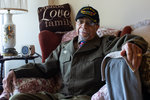
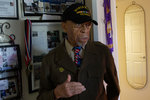
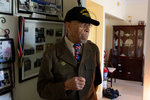
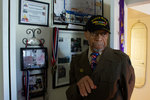
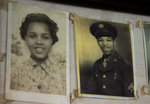
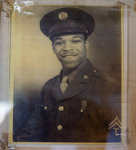
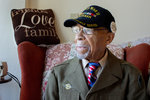
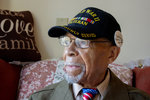
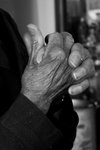

Not long after the draft notice slipped through the mail slot at his childhood home in Willow Grove, Benjamin Berry was dripping with the sly bravado of a 19 year-old ready to save the world.
“I was so gung ho. The war was going to be over as soon as I got there,” said Berry, 98, who now lives in Germantown.
What he found as U.S. forces sank deeper into World War II was a military that assigned him to a segregated unit for Black servicemen that transported supplies, and operated tent facilities for soldiers to shower and bathe when they returned from the battlefield.
The military gave Berry a gun, but no ammunition.
It was only during an historic European offensive launched by Adolf Hitler’s forces that Berry and other Black soldiers in his unit were given bullets and expected to fight. They loaded up in the frigid Ardennes Forest for the Battle of the Bulge.
The memories are still vivid for Berry, but especially so in the weeks leading up to Veterans Day when he travels from parades to ceremonies to speaking engagements, honoring men and women in the military and sometimes soaking up a bit of acclaim himself.
His most recent accolade is a citation and medal from the Grand Duke of Luxembourg in recognition of his service as part of the 863rd Quartermaster Fumigation and Bath Company.
Berry, who earned the rank of corporal, served from 1943-1945 and participated in the Normandy campaign and the Battle of Northern France. His unit moved across the European theater until the end of the war when the 863rd was among the troops welcomed as heroes after Allied forces liberated Nazi-occupied Pilsen in what is now the Czech Republic.
On Veterans Day, Berry is scheduled to be among the guests during afternoon ceremonies at Philadelphia National Cemetery in West Oak Lane, the oldest of four national cemeteries in the region.
For Berry, the public acknowledgement has been rewarding. People have “recognized what we did to save this country. They recognize it and it makes us feel proud of what we did,” Berry said in an interview, during which he wore an olive green Army uniform borrowed from the ACES Museum in Germantown, which preserves the history of minority veterans who served in World War II.
Of the 16.5 million men and women who served the war, only about 240,000 are still living, according to the U.S. Department of Veterans Affairs. Of the 16.5 million, more than 900,000, or less than ten percent, are Black.
“Veterans put their lives on the line for us,” said Dr. Althea Hankins, founder of the ACES Veterans Museum. “We want the museum to be a beacon” that represents a community that doesn’t get the recognition it deserves, Hankins said.
Since World War II, minority service men and women have comprised an increasing percentage of the military. But inequality remains despite milestones such as the appointment of Gen. Charles Q. Brown Jr., the first black officer to lead a branch of the U.S. Armed Forces.
Among the disparities: Black veterans suffer higher rates of unemployment, and Black people in the military endure more severe injuries during their service and are less likely to be promoted, according to government statistics.
“There’s been slow improvement, but it’s still white-dominated and male-dominated,” said Deborah Gary of Mount Airy, a retired major in the Air Force who serves on the advisory board of the ACES Museum. Berry also serves on the board.
Berry was a youngster growing up in the Crestmont section of Willow Grove when he was drafted. He graduated from Abington High School in June of 1943. By July, he was in basic training at Fort Frances E. Warren in Wyoming.
Berry was assigned to the 863rd Quartermaster Fumigation and Bath Company, a unit of black servicemen supervised by white officers. Berry drove a truck and transported supplies. Back then, he didn’t consider his assignment to be discriminatory.
Berry says he experienced one incident of overt prejudice. In uniform, he walked into a restaurant in St. Louis, Missouri, with two fellow servicemen. They ordered hamburgers at the counter, paid for them and were handed their lunch. When the soldiers went to sit down to eat, they were told they couldn’t eat inside.
“I slapped the burger down on the counter and left,” Berry said.
He was assigned to Fort Dix in New Jersey and from there he traveled overseas. From London, he boarded a carrier that transported troops to Normandy. He landed 22 days after D-Day, June 6, 1944, when Allied forces invaded France. Berry’s unit followed the infantry across Europe and in December was encamped in the Ardennes forest when the Allies and German forces fought in the Battle of the Bulge. Berry never fired a shot.
Berry remembers the snow, the death and the sound of exploding bombs dropped in the forest.
“We didn’t think of it as danger, we thought of the glory part.” Berry said, “We thought of it as changing the world.”
After the war, Berry came home to Willow Grove. He studied painting and paperhanging under the GI Bill, but finding a job was difficult. When Berry tried to join a union, he was turned away because he was Black. He opted to be self-employed.
Despite his military service, Berry says he and other black veterans were “treated like second class citizens.” But since then, he says “progress has been made” and he feels it when he walks down the street in a WWII hat and strangers thank him for his service,
Shortly after he was discharged, Berry married Lois Miller Graves and the couple raised four children in Germantown. Berry’s wife died 17 years ago. Earlier this year, Berry sold his house and moved into a retirement community nearby.
His cozy apartment is decorated with reminders of his service: posters, photos, certificates, awards and other World War II memorabilia. On his bedspread is a depiction of the American Flag. The Stars and Stripes cover his entire bed. A poster featuring a photo of Berry and 33 other area World War II veterans taken in 2008 hangs on his bedroom wall.
“Only two of us are left,” Berry said, pointing to Jake Russo. An hour later, the two men drove off together to attend their next veterans’ event where they were honored for their service.
.